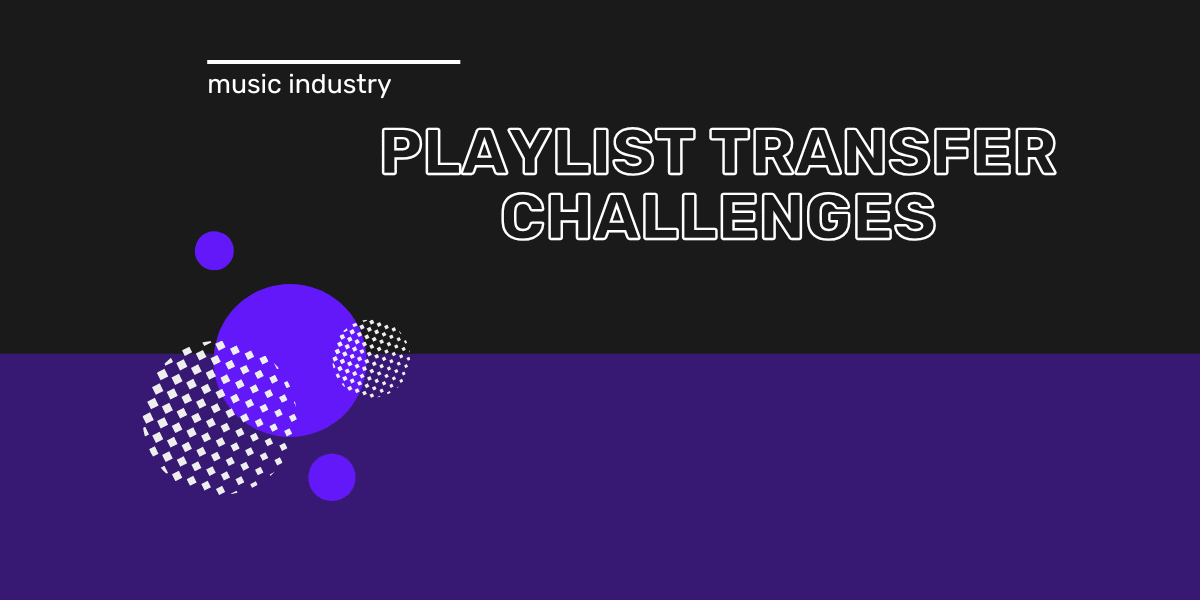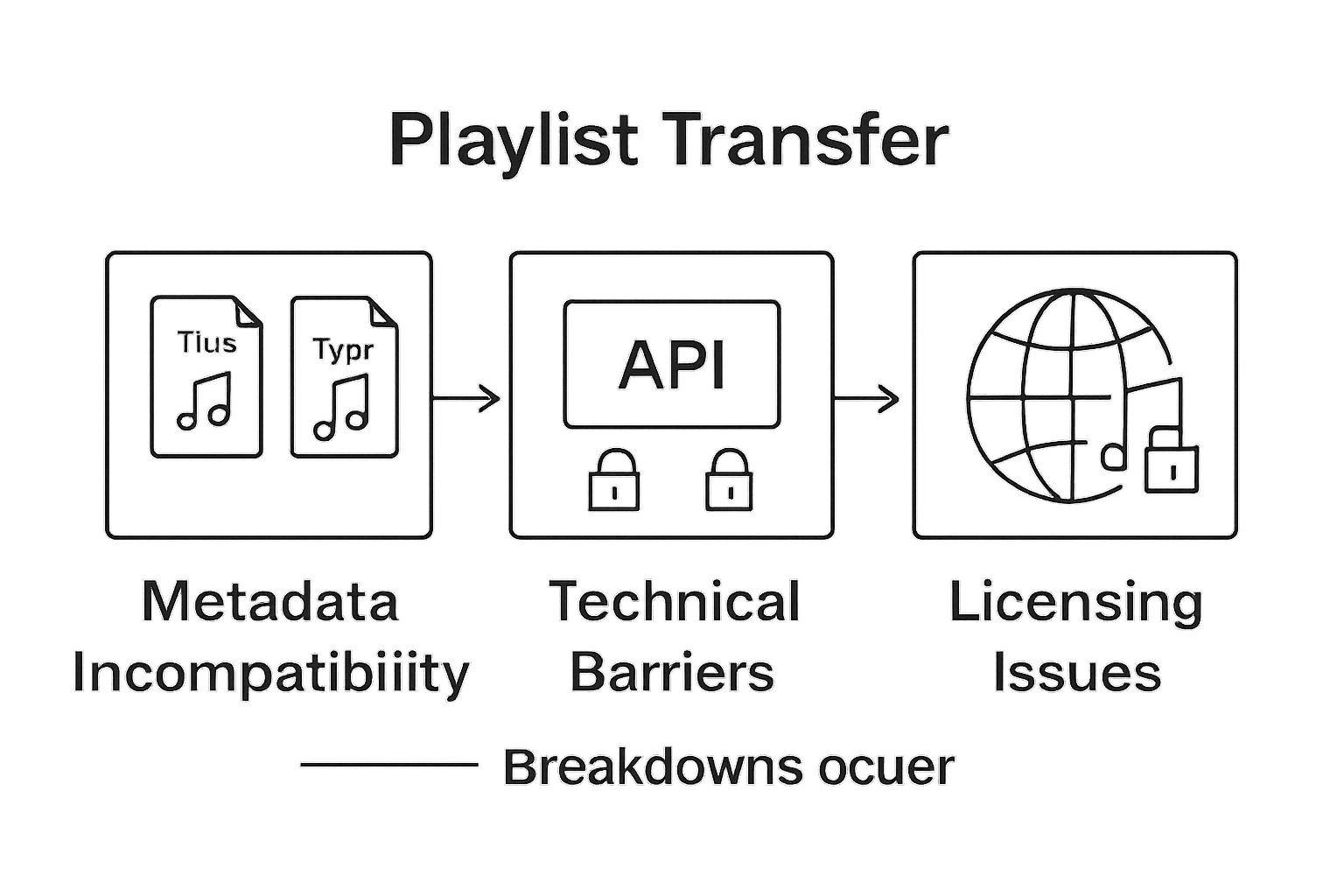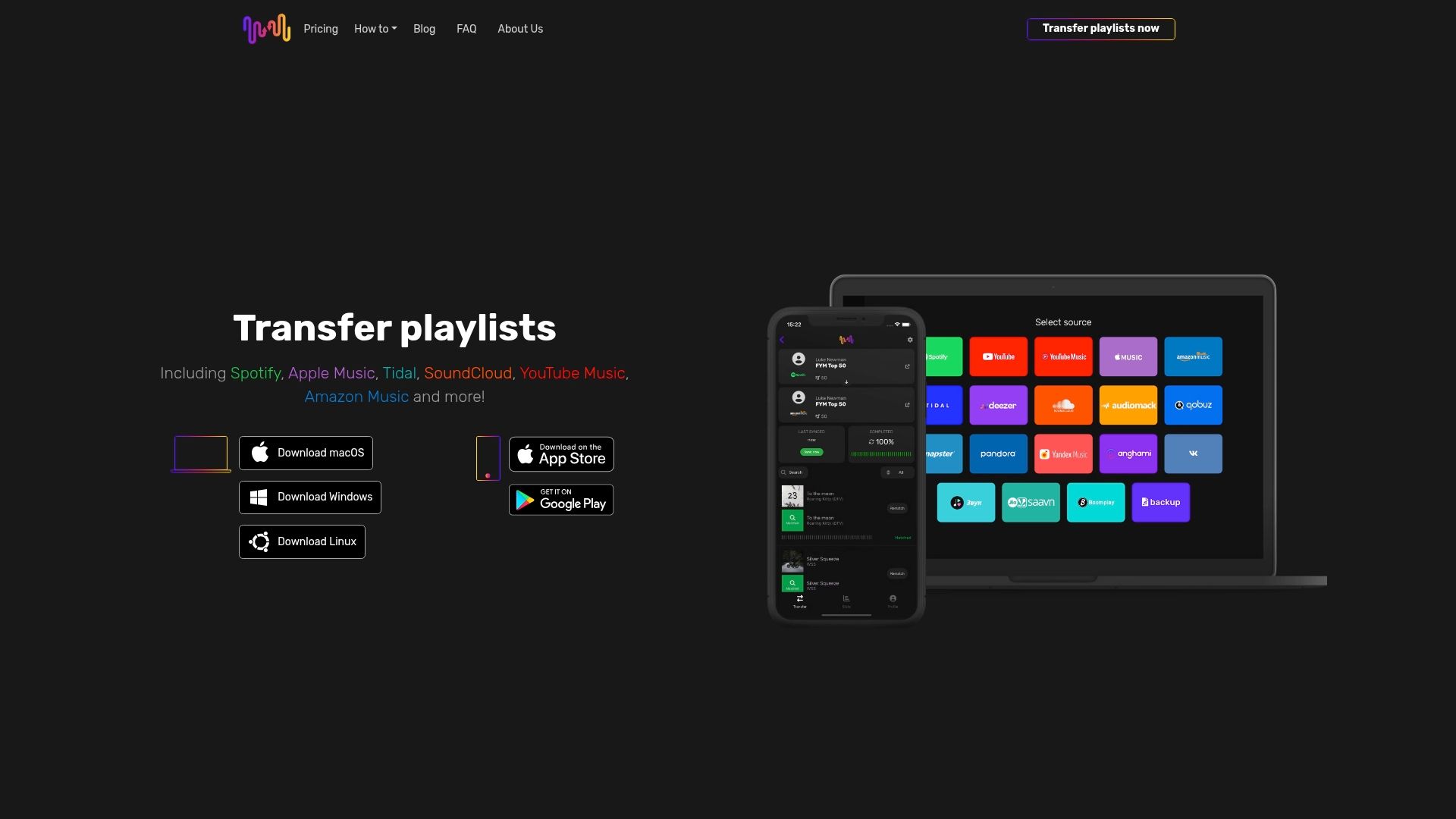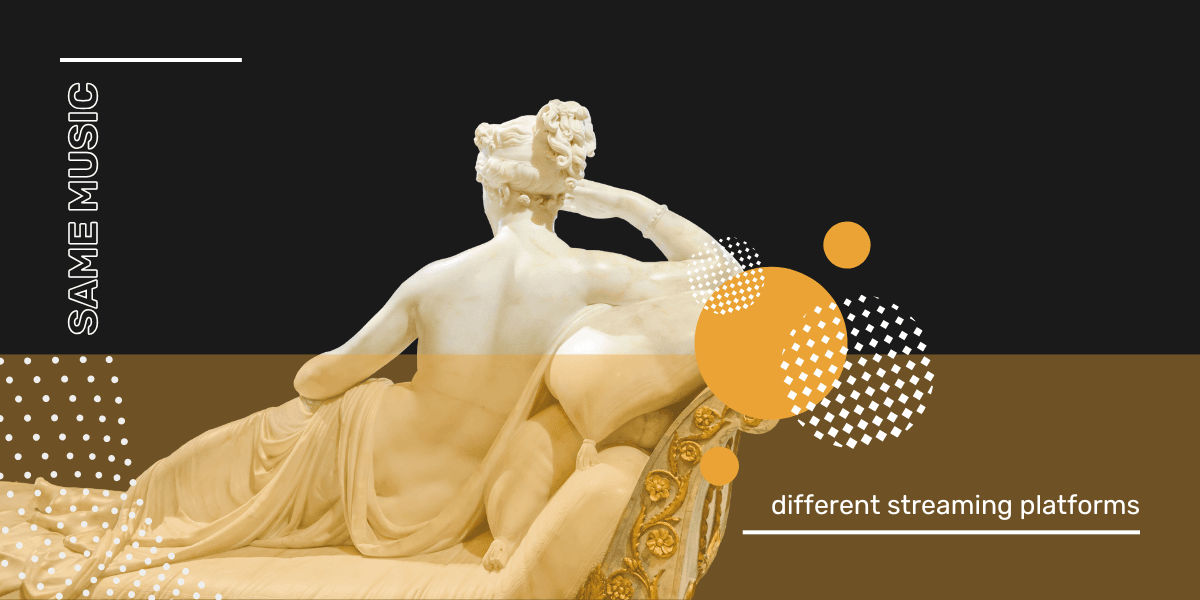Music news, tips & stories
Stay updated with the latest music streaming insights, playlist management tips, and industry news.
Understanding Playlist Transfer Challenges for Music Fans
November 4, 2025

Moving your playlists between music streaming platforms sounds simple, right? Yet research shows that up to 20 percent of tracks can vanish during playlist transfers. Most people expect a click to do the job, but the real roadblock comes from hidden layers of metadata confusion and licensing quirks that can chop up your playlists in ways you would never suspect. What really makes playlist migration such a headache for music lovers might surprise you.
Table of Contents
- What Are Playlist Transfer Challenges And Their Impact?
- Metadata Incompatibility Issues
- Technical Barriers In Playlist Migration
- Why Playlist Transfer Challenges Matter For Music Lovers
- Emotional Investment In Musical Collections
- The Time And Effort Cost
- How Playlist Transfer Challenges Affect Different Music Platforms
- Platform-Specific Metadata Complexities
- Catalog Availability And Licensing Restrictions
- Key Concepts And Technologies Behind Playlist Transfers
- Music Metadata Standardization
- Algorithmic Matching Technologies
- Real-World Examples Of Playlist Transfer Issues
- Track Availability And Compatibility Scenarios
- Licensing And Digital Rights Management Complexities
Quick Summary
| Takeaway | Explanation |
|---|---|
| Metadata compatibility issues hinder transfers | Different platforms use unique metadata systems, causing song matches to fail or lose vital information when transferring playlists. |
| Technical barriers complicate migration | Proprietary APIs and database structures make it hard to transfer playlists seamlessly, often requiring manual reconstruction. |
| Emotional connection impacts users | Playlist transfer difficulties can sever emotional ties to music collections, causing distress for music lovers. |
| Licensing affects track availability | Licensing restrictions and regional rights can lead to significant playlist disruptions during transfers between platforms. |
| Standardization is crucial for solutions | Efforts towards common metadata standards and algorithmic matching are essential to enable smoother playlist transfers across services. |
What Are Playlist Transfer Challenges and Their Impact?
Playlist transfer challenges represent complex technical and user experience obstacles that prevent seamless music collection migration between different streaming platforms. These challenges emerge from fundamental differences in how streaming services store, organize, and manage music metadata, ultimately creating significant friction for music fans seeking to move their carefully curated playlists.
Metadata Incompatibility Issues
At the core of playlist transfer difficulties lies metadata incompatibility. Each music streaming service maintains unique systems for tracking song information, which means a track on Spotify might have slightly different metadata compared to the same track on Apple Music. According to research from digital music analytics, these discrepancies can result in:
- Incomplete song matches during transfer
- Lost playlist ordering
- Missing track information
- Potential duplicate entries
These metadata variations create significant challenges for users attempting to migrate their music libraries across platforms.

Technical Barriers in Playlist Migration
The technical infrastructure of streaming services introduces substantial barriers to playlist transfer. Different platforms use proprietary APIs and database structures that are not designed for easy interoperability. This means users often face:
- Complex manual reconstruction of playlists
- Potential loss of song selections
- Time-consuming transfer processes
- Inconsistent track availability across services
For music enthusiasts with extensive collections, these challenges can feel overwhelming and discourage platform switching. Learn more about seamless playlist transfers to understand how technology is evolving to address these persistent issues.
Understanding these playlist transfer challenges helps users appreciate the complexity behind seemingly simple music library migrations and highlights the need for more standardized approaches in digital music ecosystem design.
The following table summarizes different types of playlist transfer challenges discussed in the article, along with their causes and impacts on user experience.
| Challenge Type | Cause/Source | Impact on User Experience |
|---|---|---|
| Metadata incompatibility | Different metadata systems across platforms | Missing or mismatched tracks in playlists |
| Technical barriers | Proprietary APIs, database structures | Manual reconstruction, inconsistent results |
| Licensing and regional restrictions | Distinct agreements and regional rights | Unavailable or missing tracks |
| Catalog differences | Different platform music libraries | Loss of unique or exclusive tracks |
| Emotional/time investment | Loss of carefully curated order, memories | User frustration and reluctance to switch |
| Incomplete song matches | Variations in track identifiers and metadata standards | Duplicate or lost entries |
Why Playlist Transfer Challenges Matter for Music Lovers
Playlist transfer challenges extend far beyond mere technical inconveniences, representing a profound disruption to personal musical experiences and emotional connections with music. For passionate music lovers, playlists are more than simple song collections they are carefully curated narratives that reflect individual journeys, memories, and emotional landscapes.
Emotional Investment in Musical Collections
Music collections are deeply personal artifacts that capture moments, moods, and memories. Research from The Conversation highlights how playlist migrations can potentially sever emotional connections with music. Listeners invest significant time and emotional energy into creating playlists that represent:
- Personal soundtracks of life experiences
- Carefully sequenced musical journeys
- Mood-based compilations
- Chronological musical memories
When transfer challenges disrupt these collections, it feels like losing a part of one's personal narrative.

The Time and Effort Cost
Music enthusiasts understand that playlist creation is not a casual activity but a meticulous process of musical curation. The time required to reconstruct playlists across different platforms can be substantial. Learn more about playlist management and understand the intricate challenges music fans face.
Transfer difficulties mean listeners might spend hours manually recreating playlists, potentially losing rare tracks, specific versions, or carefully ordered song sequences.
This represents not just a technical challenge but a significant emotional and time investment that can discourage platform exploration and musical discovery.
Understanding these challenges illuminates why seamless music migration matters deeply to music lovers who view their playlists as personal archives of sonic memories and emotional experiences.
How Playlist Transfer Challenges Affect Different Music Platforms
Playlist transfer challenges manifest uniquely across various music streaming platforms, creating a complex ecosystem where seamless music migration remains an elusive goal. Each platform approaches music storage, metadata management, and track cataloging through distinct technological frameworks, resulting in significant interoperability obstacles.
Platform-Specific Metadata Complexities
Music streaming platforms maintain fundamentally different metadata standards, which creates substantial barriers during playlist transfers. According to research on cross-platform playlist portability, these platform-specific variations include:
- Unique track identification systems
- Varied audio file encoding protocols
- Different artist and album categorization methods
- Proprietary music recommendation algorithms
These intricate differences mean that a playlist perfectly structured on one platform might experience significant distortions when transferred elsewhere.
Catalog Availability and Licensing Restrictions
Beyond technical challenges, licensing agreements and regional music rights further complicate playlist transfers. Music platforms negotiate distinct licensing contracts, which means track availability can vary dramatically between services. Explore playlist transfer solutions to understand the nuanced landscape of digital music migration.
Some platforms might possess exclusive tracks or regional music variations, creating additional complexity for users attempting to maintain consistent playlist experiences across different streaming environments. This fragmentation underscores the need for more standardized approaches to digital music ecosystem design, enabling smoother user experiences and reducing technological friction in music consumption.
This table highlights key metadata features and differences across music streaming platforms that contribute to playlist transfer challenges as described in the article.
| Aspect | Platform Differences | Effect on Playlist Transfer |
|---|---|---|
| Track identification systems | Unique IDs for each service | Songs may not map 1:1 across platforms |
| Audio file encoding protocols | Varying formats and standards | Some tracks may have compatibility issues |
| Artist/album categorization | Differing naming conventions and hierarchies | Misattribution or separation of albums/artists |
| Recommendation algorithms | Proprietary algorithms for discovering and linking tracks | Personalized recs may not translate |
| Catalog and licensing restrictions | Different agreements and regional access | Missing, exclusive, or region-locked tracks |
Key Concepts and Technologies Behind Playlist Transfers
Playlist transfer technologies represent a complex intersection of music metadata management, API integration, and sophisticated algorithmic matching techniques. These technologies aim to solve the intricate challenge of seamlessly migrating music collections across diverse streaming platforms while preserving the original playlist's essence and user experience.
Music Metadata Standardization
Music metadata serves as the foundational infrastructure for playlist transfers. According to research on digital music platforms, successful playlist migration requires sophisticated approaches to track identification and matching. Key metadata standardization elements include:
- Unique track identifiers
- Comprehensive artist information
- Precise audio fingerprinting techniques
- Cross-platform track recognition algorithms
These standardization efforts help bridge the technological gaps between different streaming service ecosystems, enabling more accurate and reliable playlist transfers.
Algorithmic Matching Technologies
Advanced algorithmic matching represents the core technological innovation in playlist transfer solutions. These algorithms analyze multiple data points to identify and map songs across different platforms, considering nuanced variations in track metadata. Learn more about playlist migration technologies to understand the sophisticated technical approaches employed by modern transfer services.
The most effective matching technologies go beyond simple title and artist comparisons, incorporating audio fingerprinting, acoustic analysis, and machine learning techniques to ensure maximum playlist fidelity during cross-platform migrations. This approach helps preserve the intricate musical experiences users have carefully curated, transforming what was once a manual and frustrating process into a seamless, automated solution.
Real-World Examples of Playlist Transfer Issues
Playlist transfer challenges are not hypothetical concepts but tangible problems affecting millions of music enthusiasts worldwide. These issues manifest through complex interactions between technological limitations, licensing restrictions, and platform-specific metadata management systems.
Track Availability and Compatibility Scenarios
Music catalog differences create significant transfer obstacles for users migrating between platforms. Academic research reveals that up to 20% of tracks can disappear during playlist transfers, presenting substantial disruptions to musical experiences. Common scenarios include:
- Tracks unavailable in alternative platform catalogs
- Regional licensing restrictions
- Metadata mismatches preventing accurate song identification
- Different audio encoding standards
These compatibility challenges transform what should be a straightforward transfer into a frustrating experience for music lovers attempting to preserve their carefully curated collections.
Licensing and Digital Rights Management Complexities
Digital rights management introduces another layer of complexity in playlist transfers. Some tracks become inaccessible due to intricate licensing agreements that vary across geographical regions and streaming platforms. Explore playlist migration strategies to understand the nuanced landscape of digital music rights.
Music enthusiasts often discover that seemingly identical tracks can have dramatically different availability depending on the streaming service, platform, and user's geographical location. This fragmentation underscores the need for more standardized approaches to digital music rights and platform interoperability, ensuring that users can seamlessly enjoy their musical collections across different streaming environments.
Make Playlist Transfers Effortless With Free Your Music
Struggling with playlist transfer challenges? If you have ever lost song order, faced missing tracks, or spent hours recreating collections, you know how frustrating metadata compatibility and platform differences can be. The article highlighted how these technical barriers disrupt not only your music experience but also your most personal playlists and memories.

Stop letting platform limits break your musical journey. With Free Your Music, you can automatically synchronize your playlists, preserve every song and order, and transfer your music between services like Spotify, Apple Music, and more—all in minutes. Take the next step right now and experience seamless migration with a user-friendly solution. Start your hassle-free transfer today at FreeYourMusic.com.
Frequently Asked Questions
What are playlist transfer challenges?
Playlist transfer challenges refer to the technical and user experience obstacles that hinder the seamless migration of music collections across different streaming platforms. These challenges arise from differences in how services manage and store music metadata.
Why do metadata incompatibility issues occur during playlist transfers?
Metadata incompatibility issues occur because each streaming service utilizes unique systems to track song information. As a result, tracks may not match perfectly during a transfer, leading to incomplete song matches, lost playlist ordering, and potential duplicate entries.
How do licensing restrictions affect playlist transfers?
Licensing restrictions can complicate playlist transfers, as different platforms have unique agreements with music rights holders. This can result in some tracks being unavailable on certain services, making it difficult to maintain consistent playlists when migrating.
What technologies help improve playlist transfer processes?
Technologies that improve playlist transfer processes include music metadata standardization and advanced algorithmic matching. These approaches aim to accurately identify and map songs across platforms, reducing errors and enhancing the user's playlist migration experience.





